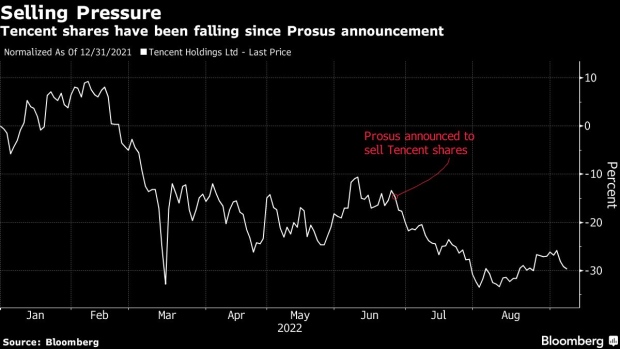Sep 7, 2022
Tencent Stake Worth $7.6 Billion Appears in Hong Kong Clearing System
, Bloomberg News

(Bloomberg) -- Naspers Ltd.’s Dutch unit Prosus NV continued its plan to cut back its stake in Tencent Holdings Ltd., the latest in a series of moves from early backers to unwind bets on Chinese companies.
Tencent shares worth $7.6 billion had earlier appeared in Hong Kong’s clearing and settlement system, typically a precursor to offloading stock. Prosus said later on Thursday the movement of shares, and eventual sale, will help fund its own share-buyback program.
Read More: Legendary China Bets Unwind as Buffett, SoftBank, Naspers Sell
It’s the latest in a series of sales from big-name investors who made huge profits from early bets on Chinese companies. Last month, SoftBank Group Corp. said it unloaded billions of dollars worth of shares in e-commerce pioneer Alibaba. Last week, Warren Buffett’s Berkshire Hathaway Inc. further trimmed its stake in China’s biggest electric-vehicle maker BYD Co.
The sales show increasing anxiety over the prospects for China’s biggest companies as President Xi Jinping tightens the government’s grip on the private sector and the economy falters under persistent Covid lockdowns.
Dutch e-commerce firm Prosus in stake in Tencent after its parent, Naspers Ltd., became an early investor more than two decades ago. In late June, Prosus said it planned to reduce its stake to fund a buyback program, adding pressure to the Chinese online game company’s stock. “We will keep selling Tencent shares to buy back our own, it’s open-ended and an unlimited program,”, Chief Executive Officer Bob Van Dijk said in an interview at the time.
Prosus said then disposals of its stake in Tencent would be done in small chunks of about 3% to 5% of the Chinese company’s daily trading volumes. A stake sale of 2% would far exceed its stated sales policy, and the news of a possible deal has been weighing on Tencent’s share price. Shares fell 3.2% in Hong Kong on Thursday, taking their loss from a June high to 24%.
The move to start selling Tencent stock was done to narrow a discount between Prosus and its parent Naspers’ value, to that of its stake in the Chinese firm.
“People are worried that the big holder will keep selling their stake and there is no timetable when their sale will end,” said Steven Leung, executive director at Uob Kay Hian (Hong Kong) Ltd. “This kind of changes in the clearing system will always trigger worries that more selling will happen in near future.”
Several global investors have trimmed their holdings in major Chinese firms in recent months, fanning concern of more selling to hit the market. That includes Warren Buffett’s Berkshire Hathaway Inc. paring back its stake in BYD Co., the nation’s biggest electric maker. SoftBank Group Corp. also has plans to sell its holdings in Alibaba Group Holding Ltd.
Read: Tencent Backer Prosus to Cut $134 Billion Stake to Buy Stock (2)
Headwinds
The stake reduction is likely the next setback for a company that’s seen multiple blows following Beijing’s broad regulatory crackdown and China’s slowing economic growth. Faced with declining revenue, Tencent has been looking to ease investor worry by cutting costs as well as selling off its own assets, which include online retailer JD.com Inc. and Singapore’s Sea Ltd.
It’s also been buying back shares in the open market recently on a near daily basis, even though that’s not helped cushion broader market angst.
“There will be an overhang for Tencent for sure but given it’s not a block sale, should not be too negative,” said Justin Tang, head of Asian research at United First Partners. “Shares dropped in the past few days partly due to more Naspers selling, but also due to macro concerns. Plus the crackdown on the tech sector of course.”
(Update with additional context throughout.)
©2022 Bloomberg L.P.





